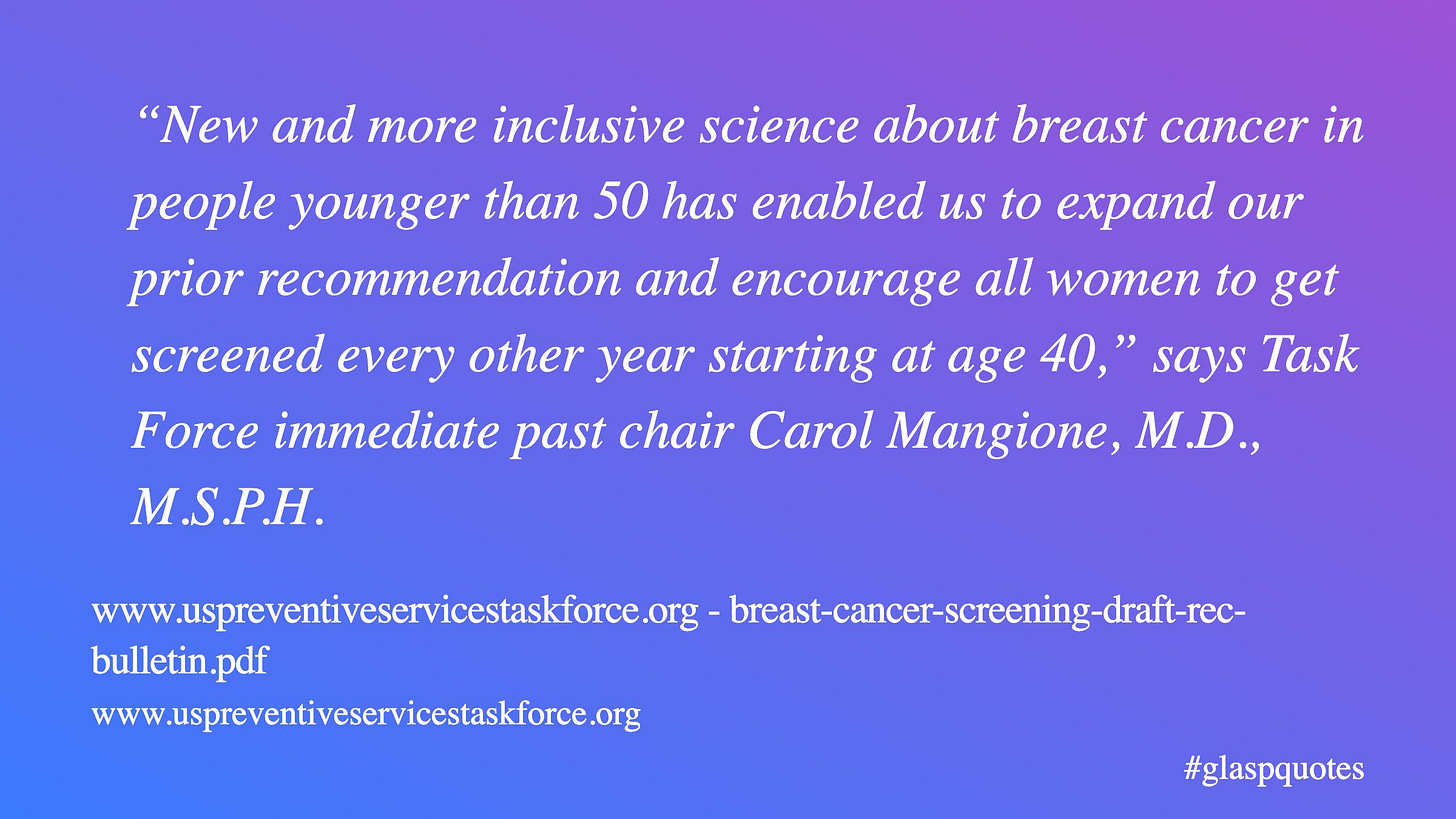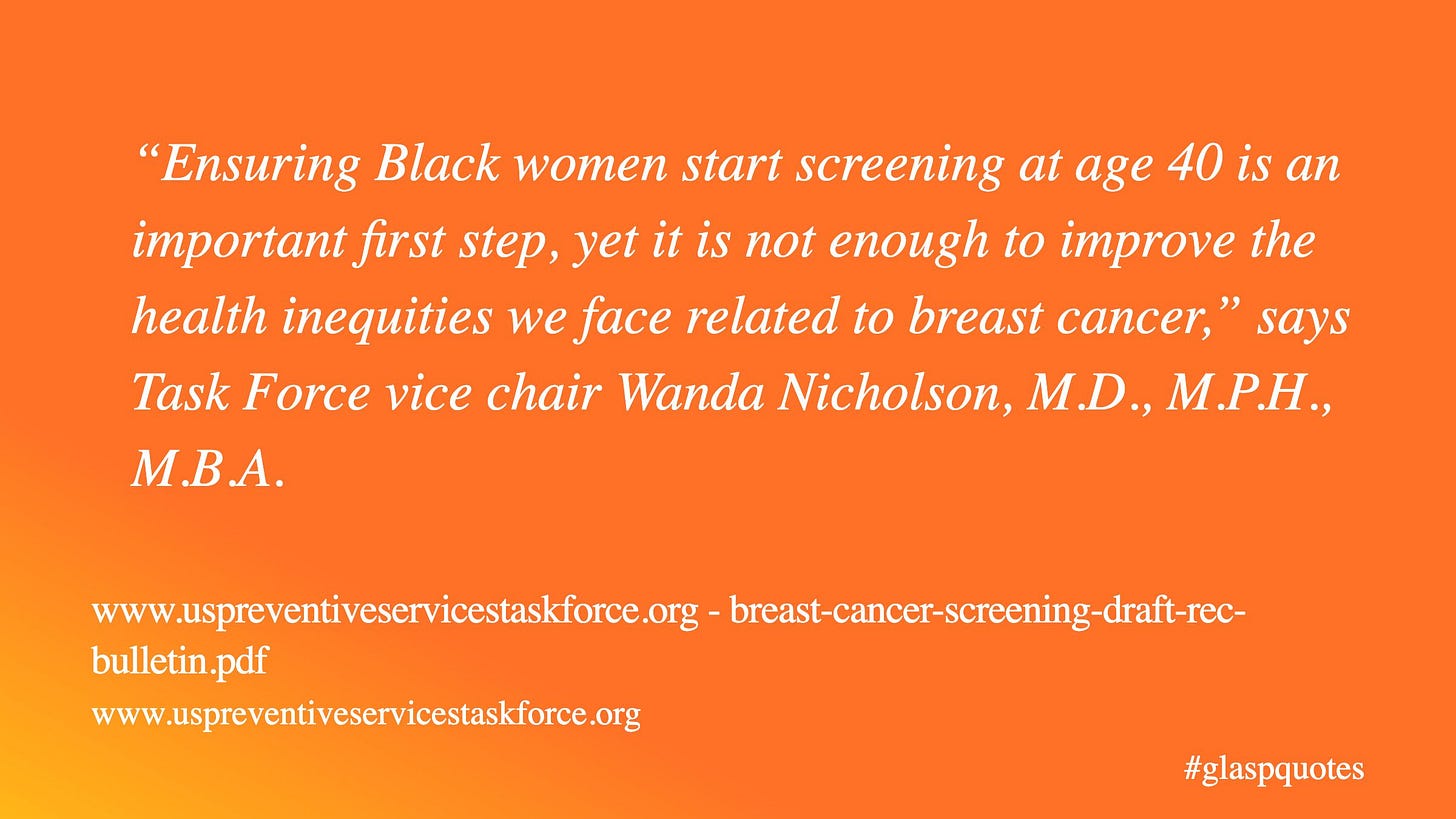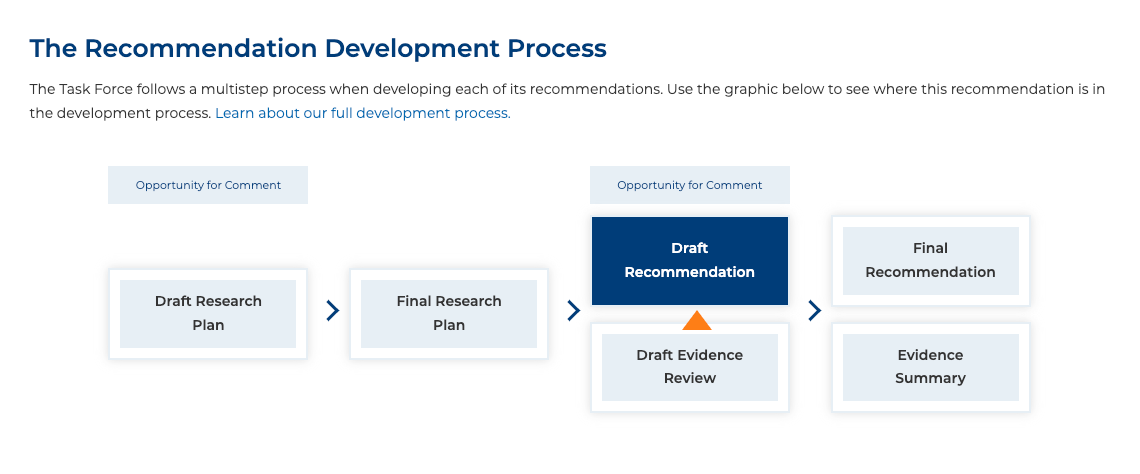Health Highlight: Wed. 10, May.
Today’s Highlight(s): Key points from the U.S. Preventative Services Task Force’s Draft Recommendation Statement on Screening for Breast Cancer.
Health Highlights workflow is powered by Glasp.co and Perplexity.ai; produced using iA Writer and Keynote.
Have a question? Want to be a sponsor? Get in touch: carlosfranco.bio
🧠 Learn, ❤️ Like, 🤝 Share, and 📩 Subscribe!

THE BRIEF
The recommendation for breast cancer screening for cisgender women aged 40 (including persons assigned female at birth) has been changed from “screening based on health history and personal preference” to recommending all women begin screening at age 40. 1
Key Statements
This draft recommendation applies to women at average risk of breast cancer.
This includes people with a family history of breast cancer and people who have other risk factors, such as having dense breasts.
It does not apply to people who have a personal history of breast cancer, who are at very high risk of breast cancer due to certain genetic markers or a history of high-dose radiation therapy to their chest at a young age, or who have had a high-risk lesion on previous biopsies.
Anyone concerned with their breast health should talk with their healthcare professional.

Double-click
Screening refers to examining and testing for breast cancer before there are any signs or symptoms. 2
This change was made to reflect new research showing the value of earlier screening as well as to help close the gap in health outcomes for Black women who are diagnosed with breast cancer earlier and in a more aggressive form. 1 3

Grades in this recommendation:
B: The USPSTF recommends the service. There is high certainty that the net benefit is moderate or there is moderate certainty that the net benefit is moderate to substantial.
I (Statement): The USPSTF concludes that the current evidence is insufficient to assess the balance of benefits and harms of the service. Evidence is lacking, of poor quality, or conflicting, and the balance of benefits and harms cannot be determined†.
†This may seem like a contradiction, but it simply means that more research is needed to quantify and qualify the benefits over the harms produced by this recommendation and that it has not been finalized.
What the Grades Mean and Suggestions for Practice
Figure 1. The Recommendation Development Process

What is the United States Preventive Services Task Force (USPSTF)?
The USPSTF is an independent group of nationally recognized experts who make evidence-based recommendations about clinical preventive services such as screenings, counseling services, and preventive medications. 4 5 6
Another recent USPSTF Recommendation
Health Highlight: Mon. 24, Apr. — A Look at the U.S. Preventative Services Task Force (USPSTF) Skin Cancer: Screening and Final Recommendation Statement
RESOURCES
If you have questions or need additional information about breast cancer screening, the following organizations are reputable and reliable sources for information and support:
The National Cancer Institute
Free, credible, and comprehensive information about cancer prevention and screening, diagnosis, and treatment; research across the cancer spectrum; clinical trials; and news and links to other NCI websites.
Questions about cancer? 1–800–422–6237 LiveHelp Chat
The American Cancer Society (ACS)
The American Cancer Society (ACS) is a nationwide, community-based voluntary health organization. In addition to providing a wide variety of services and programs for cancer patients, their families, friends, and caregivers, the ACS also supports cancer research, advocacy, and education. Free Line: 1-800-227-2345
Sisters Network® Inc.
Sisters Network® Inc. (SNI) is a national African American breast cancer survivorship organization that addresses the breast health needs of African American women through its affiliate chapters and partnerships with existing service providers. Free Line: 1–866–781–1808
Susan G. Komen for the Cure®
Susan G. Komen for the Cure® is a grassroots network of breast cancer survivors and activists working together to save lives, empower people, ensure quality care for all, and energize science to find cures. The 1–877–465–6636 (1–877 GO KOMEN) helpline provides free, professional support services to anyone with breast health and breast cancer concerns, including breast cancer patients and their families.
Triple Negative Breast Cancer Helpline (TNBC)
The Triple Negative Breast Cancer Foundation (TNBC), in partnership with CancerCare, offers free, professional support services to anyone affected by triple-negative breast cancer. Online resources include information on diagnosis, treatment, and survivorship, publications, and a variety of educational and support forums. Free Line: 1–877–880–8622
Keywords 🏷️: BreastCancer CancerScreening WomensHealth HealthcareEquity USPSTF NCI NOTES
“Task Force Issues Draft Recommendation Statement on Screening for Breast Cancer”
“Breast Cancer Screening (PDQ®)–Patient Version: “What is screening?”
https://www.cancer.gov/types/breast/patient/breast-screening-pdq
“The Biology of Cancer Health Disparities: Triple-Negative Breast Cancer in African American Women”
https://www.cancer.gov/research/progress/discovery/biology-cancer-health-disparities
“About the USPSTF”
“Appendix D: About the U.S. Preventive Services Task Force”
“NCI Dictionary: United States Preventive Services Task Force”




